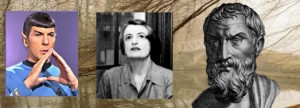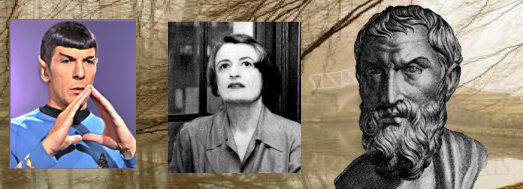“Against The Vulcans”
 The thoughts in this post will no doubt need review and revision, but I think they are significant enough to post. I am going to deal here not so much with the fine details, but with what I consider to be the general “public perception” of the views of two contemporary figures: Mr. Spock and Ayn Rand. Ayn Rand is an extremely complex figure, but I think it is fair to observe that most of her followers fall into the “Vulcan” mindset associated with Mr. Spock, whose character came to represent someone devoted to a Platonist attitude elevating “reason” and “logic” above all, to the point of being dismissive and disdainful of all “emotion.”
The thoughts in this post will no doubt need review and revision, but I think they are significant enough to post. I am going to deal here not so much with the fine details, but with what I consider to be the general “public perception” of the views of two contemporary figures: Mr. Spock and Ayn Rand. Ayn Rand is an extremely complex figure, but I think it is fair to observe that most of her followers fall into the “Vulcan” mindset associated with Mr. Spock, whose character came to represent someone devoted to a Platonist attitude elevating “reason” and “logic” above all, to the point of being dismissive and disdainful of all “emotion.”
I have recently been reflecting on a famous phrase of Ayn Rand that: “emotions are not tools of cognition.” Of course the words “emotion,” “tool,” and “cognition” might be defined in ways that this phrase could be reconciled with Epicureanism, but in my view that the phrase is commonly interpreted as an endorsement of the attitude of Mr. Spock – and I will therefore refer to it as “Vulcanism.” The heart of the issue is as stated by Ayn Rand in the following excerpt from her “Objectivist Ethics,” in which she asserted that emotions are themselves “programmed” by “reason”:
Just as the pleasure-pain mechanism of man’s body is an automatic indicator of his body’s welfare or injury, a barometer of its basic alternative, life or death—so the emotional mechanism of man’s consciousness is geared to perform the same function, as a barometer that registers the same alternative by means of two basic emotions: joy or suffering. Emotions are the automatic results of man’s value judgments integrated by his subconscious; emotions are estimates of that which furthers man’s values or threatens them, that which is for him or against him—lightning calculators giving him the sum of his profit or loss. But while the standard of value operating the physical pleasure-pain mechanism of man’s body is automatic and innate, determined by the nature of his body—the standard of value operating his emotional mechanism, is not. Since man has no automatic knowledge, he can have no automatic values; since he has no innate ideas, he can have no innate value judgments. Man is born with an emotional mechanism, just as he is born with a cognitive mechanism; but, at birth, both are “tabula rasa.” It is man’s cognitive faculty, his mind, that determines the content of both. Man’s emotional mechanism is like an electronic computer, which his mind has to program—and the programming consists of the values his mind chooses.
If I understand this correctly (and I may not), this is a statement that the cognitive faculty, which I gather to be the process which is fairly termed to be reasoning/thinking/calculating/processing, comes first and is therefore the determinant of and superior to any emotion. It is my observation that this position is interpreted by Randians to mean that emotions, being purely mental (rather than physical, to which she contrasts the pain/pleasure mechanism in this discussion) are to be viewed with distrust and rejected as indicators of truth, since they are not themselves “tools of cognition.”
Now, if I understand Epicurus properly (at least according to DeWitt), “Anticipations” must be considered in this discussion. At least some of what falls under the term “emotion” would properly fall under the name of Anticipations in this third category of the Epicurean canon. For example, as DeWitt observed in regard to emotional assessment of justice and injustice:
Again, it is positively known that Epicurus postulated the existence of an innate sense of justice and called this an Anticipation. Now injustice hurts and it is the Feelings that register this fact. If a man is condemned to pay an unjust penalty, the pain is a reaction distinct from the aural sensation of hearing the verdict.
also…..
Epicurus denied the existence of Platonic ideas on the ground that the only existences were atoms and empty space. Thus to his thinking man stood face to face with physical reality and his sensations constituted the sole contact with this reality. Had he stopped at this point he would have been an empiricist, but he did not. He made room also for a kind of intuition, which is incompatible with empiricism. He postulated that man was equipped in advance by Nature for living in his prospective environment, and not in his physical environment alone but also in his social environment. In addition to the five senses this equipment included innate ideas, such as that of justice, and these ideas, because they existed in advance of experience, were called Anticipations. Moreover, as Epicurus postulated, each experience of the individual, the sensations included, is accompanied by a secondary reaction of pleasure or pain. These pleasures and pains are the Feelings, which also rank as criteria, being Nature’s Go and Stop signals.” [Note: I think even under the DeWittian view the term “innate idea” here is unfortunate, and should probably have been described as “innate principle” to distinguish the perceiving mechanism from the actual particular content that is perceived.]
A means of reconciliation of these views is to remember the important distinction that just as with seeing and hearing and the rest of the five senses, all individual sensations are not “true” in and of themselves. All sensations, including Anticipations, convey information which is entitled to respect, but they must be checked against multiple observations. On their own, an isolated and single observation of sight or hearing — or a single Anticipation — may be misleading as to the truth of the whole matter under consideration.
I need to think much further about these matters, but my tentative observation is that the erroneous and disdainful rejection of “emotion” by the Randians amounts to “Vulcanism,” and is a major error, and it results in fully one-third of the canon of truth being eliminated from the Vulcan /Randian life – with disastrous consequences.
The better view – the Epicurean view – is that an emotional reaction is entitled to every bit as much respect as an observation of sight or sound. The critical point is that –just like those others — individual isolated observations should never be accepted as true to the facts without full analysis under the principles described in Epicurus’ canon of truth – the book of wisdom that, as it were, fell from the heavens. 🙂
I’ll close here, with the observation that Vulcanism should be rejected, for it is only with the wisdom of Epicurus that we can with confidence say:
“Live long and prosper.”
(Comments welcome on the Facebook page.)
Footnote: Two other relevant sections from DeWitt are:
“The sense of justice is innate; it is an Anticipation or Prolepsis existing in advance of experience and anticipating experience. Even certain animals possess it; elephants, for example, the bulls excepted, do not injure one another and they marshal the herd to protect one another against injury from outside.”
“While by this line of argument it will be observed that the incorporeal, eternal, and unerring reason of Plato and Aristotle is eliminated, the purely human, mortal reason remains. Even this is subordinated to the sensations: “Not even reason can refute the sensations, for reason depends wholly upon them.” 8 This does not mean, as Gassendi imagined, that the whole content of thought is derived from the sensations, which was not the teaching of Epicurus, but rather that the deprivation of sensation is virtually death.8 The basic idea is the conviction that reason is incapable of making direct contact with reality; reason is active only when the sensations are active. Without the sensations reason possesses no criteria, since they along with the Anticipations and Feelings function as contacts with reality.Only the Sensations, Anticipations, and Feelings are recognized as direct contacts between man and his physical and social environment. By virtue of being direct contacts, they acquire a priority over Reason and in effect exalt Nature over Reason as affording a norm of truth.”

